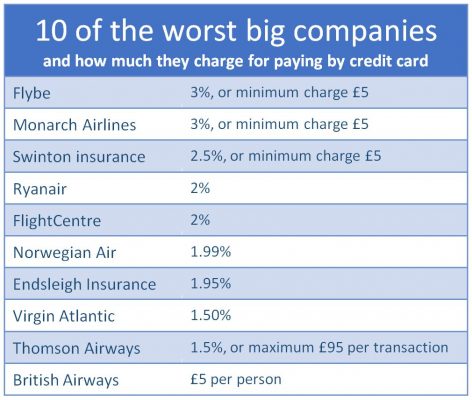Dozens of organizations – including major airlines, travel firms, local authorities and insurers – are breaking the rules and overcharging for credit card according to new research.
The offenders, many of them well-known brands, are in breach of regulations, say UK consumer group Fairer Finance.
Despite the fact UK consumer rights regulations that came into force in April 2013 say organizations can only pass on the costs they incur, some are continuing to charge their customers as much as 3 percent for paying with their credit card.
(Those regulations do not apply to insurance providers, but Fairer Finance say they believe they should “abide by the spirit of them.”)
 The consumer group Fairer Finance claim that many firms (including major airlines, travel companies, and insurers) and local authorities are overcharging for credit card use.
The consumer group Fairer Finance claim that many firms (including major airlines, travel companies, and insurers) and local authorities are overcharging for credit card use.
Fairer Finance also draw attention to an EU ruling that came into force last December. This caps the “interchange fee” – the largest part of the cost of a credit or debit card transaction. For credit cards the cap is 0.3 percent.
They say industry experts suggest companies should be charging no more than another 0.3 percent on top of the interchange fee.
Consumers should be charged no more than 1 percent
This means consumers should be charged no more than around 0.6 percent, and certainly no more than 1 percent, if they pay by credit card, say Fairer Finance.
But big brands like Flybe, Monarch, Swinton Insurance, and Ryanair – who top their list of worst offenders – are charging their customers between 2 percent and 3 percent for paying by credit card.
 Flybe, Monarch, Swinton Insurance, and Ryanair top the list of worst offenders overcharging for credit card use. The four big brands are charging consumers between 2 percent and 3 percent for paying by credit card. Data from Fairer Finance.
Flybe, Monarch, Swinton Insurance, and Ryanair top the list of worst offenders overcharging for credit card use. The four big brands are charging consumers between 2 percent and 3 percent for paying by credit card. Data from Fairer Finance.
The research shows that local authorities are also among the worst offenders, with many still charging people who use credits cards to pay for services over 2 percent.
The five worst offending local councils were: South Cambridgeshire, Oadby & Wigston, West Dorset, Bath & North East Somerset, and Ealing. All of these local authorities charged 2.5 percent for credit card use.
Fairer Finance say that many other companies – including major airlines – have either reduced fees for paying by credit card or stopped charging altogether. The fact these firms have done this only makes the ones that have not stand out more, they say.
Earlier this year, Easyjet reduced their credit card charge to 1 percent, while other major carriers such as Air Canada and United Airlines no longer charge for credit card use.
James Daley, managing director of Fairer Finance, says in their view, organizations should not be charging their customers anything for using credit cards as taking money is “a basic part of doing business.”
“However,” he adds, “if they choose to charge for accepting credit card payments – in spite of the strong public sentiment against these charges – then the rules make it very clear that they can only pass on the cost.”
Breaches should be investigated
Fairer Finance believe hundreds of companies are not following the regulations, but no one is policing these breaches. Daley says:
“Trading Standards teams across the country need to be investigating culprits in their area and fining those who don’t reduce their fees. We’d also like to see Ministers make it clear that transgressions of the rules won’t be tolerated.”
Daley says it is hard to see how these companies can continue to justify overcharging for credit card use, especially as many companies in Europe have banned it.
Such practices “distort competition,” he notes, because, for instance, when travellers are buying tickets online they often do not see the total price until they reach the final payment page.

